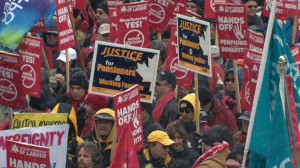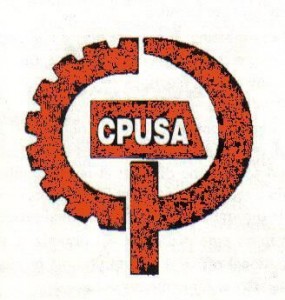The Young Communist League kicked off the start of the school year with its Red School Bus Tour. Here’s some video of a California stop.
 Fifty busloads and hundreds of cars and vans from all over Ontario were headed to Hamilton January 29, in support of steelworkers on the picket line since early November. The rally is being organized jointly by USW Local 1005, the Hamilton and District Labour Council, and the Ontario Federation of Labour, which mobilized Labour Councils and affiliates across the province.
Fifty busloads and hundreds of cars and vans from all over Ontario were headed to Hamilton January 29, in support of steelworkers on the picket line since early November. The rally is being organized jointly by USW Local 1005, the Hamilton and District Labour Council, and the Ontario Federation of Labour, which mobilized Labour Councils and affiliates across the province.
The “People vs. US Steel” rally is to support 900 locked-out Local 1005 members, as well as 9,000 retirees whose pensions will be de‑indexed if US Steel has its way. The company also wants to exclude new hires from the defined benefit pension plan. In a 2007 letter to union members, US Steel had promised to properly fund and protect the plan, because unlike others, it understood the value of good pensions to employees. Clearly, this letter was just part of a cynical propaganda campaign to convince Canadians to support the foreign takeover of Stelco operations. The cost of the purchase was $1.2 billion – the exact cost of the pension plan.
Dolores Ibárruri, General Secretary of the Central Committee of the Communist Party of Spain, in the context of the Siege of Madrid (10/1936-3/1939) made famous the slogan “¡No Pasarán!†– fascists shall not pass. The call resonates today, evoking a spirit of revolutionary optimism and defiance: Exploiters shall not pass!
– Eric Brooks
I have walked in that hinterland of despair that is unemployment. I have felt the cold hand of fear clasp my heart as needed services disappear one by one and finally the cupboards are bare and the lights are turned off and there is no more gas for the car.
While the social democrats speak of process and winning small battles, the battle at hand is big, and the urgency of now demands fundamental change in our society and in the priorities that inform our social decisions.The necessary tasks facing us as members of the working class, working women and men, we who do not exploit others for our enrichment, are immense.
The material conditions required for sustaining human life, our beautiful planet and its necessary environment, are a casualty of capitalist exploitation. US wages don’t meet the basic needs of great masses of people who find themselves making choices between shelter and food, necessary medicines and heat.
Our youth are indentured to the banks for the cost of education, their aspirations to develop themselves and build a foundation for a stable life turned against them. Many find that stability beckons but is always and increasingly beyond reach.
 In capitalism crises are unavoidable
In capitalism crises are unavoidable
The present crisis of the capitalist mode of production demonstrates the actuality of Marxism-Leninism and the revolutionary tasks in class struggle of the proletariat and its vanguard organization, communist parties. At the same time the generality of the crisis stresses out the need, to be solved with urgency, of the elaboration of a common strategy of the communist and labor parties to develop a strong and decided intervention in a stormy period, as the one opened in historical perspective.
Marx, Engels and Lenin demonstrated throughout their works that capitalism just as previous modes of production is not eternal and that in its core contradictions, that aggravate the life conditions of the masses and put at the order of the day the need to overthrow it through revolution, surge. Stable development of capitalism, which consubstantial characteristics are the cyclical crises of overproduction and over accumulation, is impossible just as Friedrich Engels describes it in an early way in the Anti-Düring
It necessary to note too that we live in the imperialist phase of capitalism and that the crisis is international, that no country escapes it. As we know, and the current crisis confirms, monopolies establish the costs over the working class while they assure their profits.
By Fidel Castro
When there are problems somewhere, is not that Marxism-Leninism lacks invincible force, the principles of Marxism-Leninism have not been correctly applied.
And we ourselves have said we have not been perfect revolutionaries, nor have we been perfect in the application of these principles; what we can say is that we have been honest and tried to be consistent. But this thing in our country next to the United States, a country so rich, so powerful, so influential, for so long, in our country and our people, who are now a stumbling block like Cuba, which is now a rock like Cuba, can only be understood in the light of the principles of Marxism-Leninism.
The role of the Party, its links with the masses, the correct application of these principles, the absence of favoritism, just actions, consideration on merit, collective leadership, democratic centralism, honesty, awareness, discipline, plus the extraordinary social and human content of the Revolution; these are the factors that have given this great strength to our Revolution, there is no mystery about it.
Fidel, December 1980
 by V. I. Lenin, July 11, 1919. First Published: Pravda No. 15, January 18, 1929. Source: Lenin’s Collected Works, 4th English Edition, Progress Publishers, Moscow, 1972 Volume 29, pages 470-488.
by V. I. Lenin, July 11, 1919. First Published: Pravda No. 15, January 18, 1929. Source: Lenin’s Collected Works, 4th English Edition, Progress Publishers, Moscow, 1972 Volume 29, pages 470-488.
Comrades, according to the plan you have adopted and which has been conveyed to me, the subject of today’s talk is the state. I do not know how familiar you are already with this subject. If I am not mistaken your courses have only just begun and this is the first time you will be tackling this subject systematically. If that is so, then it may very well happen that in the first lecture on this difficult subject I may not succeed in making my exposition sufficiently clear and comprehensible to many of my listeners. And if this should prove to be the case, I would request you not to be perturbed by the fact, because the question of the state is a most complex and difficult one, perhaps one that more than any other has been confused by bourgeois scholars, writers and philosophers. It should not therefore be expected that a thorough understanding of this subject can be obtained from one brief talk, at a first sitting. After the first talk on this subject you should make a note of the passages which you have not understood or which are not clear to you, and return to them a second, a third and a fourth time, so that what you have not understood may be further supplemented and elucidated later, both by reading and by various lectures and talks. I hope that we may manage to meet once again and that we shall then be able to exchange opinions on all supplementary questions and see what has remained most unclear. I also hope that in addition to talks and lectures you Will devote some time to reading at least a few of the most important works of Marx and Engels. I have no doubt that these most important works are to be found in the lists of books and in the handbooks which are available in your library for the students of the Soviet and Party school; and although, again, some of you may at first be dismayed by the difficulty of the exposition, I must again warn you that you should not let this worry you; what is unclear at a first reading will become clear at a second reading, or when you subsequently approach the question from a somewhat different. angle. For I once more repeat that the question is so complex and has been so confused by bourgeois scholars and writers that anybody who desires to study it seriously and master it independently must attack it several times, return to it again and again and consider it from various angles in order to attain a clear, sound understanding of it. Because it is such a fundamental, such a basic question in all politics, and because not only in such stormy and revolutionary times as the present, but even in the most peaceful times, you will come across it every day in any newspaper in connection with any economic or political question it will be all the easier to return to it. Every day, in one context or another, you will be returning to the question: what is the state, what is its nature, what is its significance and what is the attitude of our Party, the party that is fighting for the overthrow of capitalism, the Communist Party—what is its attitude to the state? And the chief thing is that you should acquire, as a result of your reading, as a result of the talks and lectures you will hear on the state, the ability to approach this question independently, since you will be meeting with it on the most diverse occasions, in connection with the most trifling questions, in the most unexpected contexts and in discussions and disputes with opponents. Only when you learn to find your way about independently in this question may you consider yourself sufficiently confirmed in your convictions and able with sufficient success to defend them against anybody and at any time.
The South African Communist Party (SACP) welcomes the political revolts and developments in Egypt and Tunisia and elsewhere, and strongly condemns the brutal responses by the collapsing regimes of dictators, in the case of Egypt we appreciate the restraint of the Military force.
These developments increasingly point out the correctness of our party`s shared strategic analysis with many of the forces in the Africa Left Networking Forum: “the crisis facing Africa, including Tunisia and Egypt, remains its deepening marginalisation and impoverishment within the global imperialist system, the failure over many decades of a variety of elite-based neo-colonial agendas on the one hand, and the degeneration and in several cases, the collapse of more radical national democratic revolutions led by former liberation movements on the other”.












